


The Grayzone | March 5, 2020
In recent years, few stories have generated as much outrage in the West as the condition of Uyghur Muslims in China. Reporting on the issue is typically represented through seemingly spontaneous leaks of information and expressions of resistance by Uyghur human rights activists struggling to be heard against a tyrannical Chinese government.
True or not, nearly everything that appears in Western media accounts of China's Uyghur Muslims is the product of a carefully conceived media campaign generated by an apparatus of right-wing, anti-communist Uyghur separatists funded and trained by the US government.
A central gear in Washington's new Cold War against China, this network has a long history of relationships with the US national security state and far-right ultra-nationalists.
At the heart of this movement is the World Uyghur Congress (WUC), an international Uyghur organization that claims to be engaged in a "peaceful, nonviolent, and democratic" struggle for "human rights." The WUC considers China's northwestern Xinjiang region to be East Turkestan, and sees its Uyghur Muslim inhabitants not as Chinese citizens but instead as members of a pan-Turkic nation stretching from Central Asia to Turkey.
As this investigation establishes, the WUC is not a grassroots movement, but a US government-backed umbrella for several Washington-based outfits that also rely heavily on US funding and direction. Today, it is the main face and voice of a separatist operation dedicated to destabilizing the Xinjiang region of China and ultimately toppling the Chinese government.
While seeking to orchestrate a color revolution with the aim of regime change in Beijing, the WUC and its offshoots have forged ties with the Grey Wolves, a far-right Turkish organization that has been actively engaged in sectarian violence from Syria to East Asia.
None of these links seem to have troubled the WUC's sponsors in Washington. If anything, they have added to the network's appeal, consolidating it as one of the most potent political weapons the US wields in its new Cold War against China.
The World Uyghur Congress, brought to you by the US government's regime change arm
The WUC promotes itself as an "opposition movement against Chinese occupation of East Turkistan [sic]" that "represent[s] the collective interests" and is "the sole legitimate organization of the Uyghur people both in East Turkistan and abroad."
Headquartered in Munich, Germany, the WUC is an international umbrella organization with a network of 33 affiliates in 18 countries around the world. The WUC and its affiliates — particularly the Uyghur American Association, Uyghur Human Rights Project, and Campaign for Uyghurs — are cited in nearly every Western media report on China's Uyghur Muslims.
From its inception, the WUC has been backed by the National Endowment for Democracy (NED). With millions in US taxpayer money, the NED and its subsidiaries have backed opposition parties, "civil society" groups, and media organizations in countries targeted by the US for regime change.
Philip Agee, the late CIA whistleblower, described the work of the NED as a more sophisticated version of the old-fashioned covert operations that Langley used to engineer. "Nowadays," Agee explained, "instead of having the CIA going around behind the scenes and trying to manipulate the process by inserting money here and giving instructions secretly and so forth, they have now a sidekick, which is this National Endowment for Democracy, NED."
Agee's assessment was confirmed by Allen Weinstein, a former Trotskyist and founding member of the NED. Weinstein told the Washington Post in 1991, "A lot of what we do today was done covertly 25 years ago by the CIA."
When the WUC was founded in 2004, the NED's then-senior Asia program officer, Louisa Coan Greve, praised the move as a "great accomplishment."
The NED has provided the WUC with millions of dollars in funding, including $1,284,000 since 2016 alone, and millions of dollars in additional funding to WUC-affiliate organizations. The grants are earmarked for training Uyghur activists and youth in media advocacy and lobbying "to raise awareness of and support for Uyghur human rights," with a particular focus on US Congress, European Parliament, and the United Nations.
In 2018, the NED provided the WUC and its offshoots with close to $665,000, according to the former organization's website.
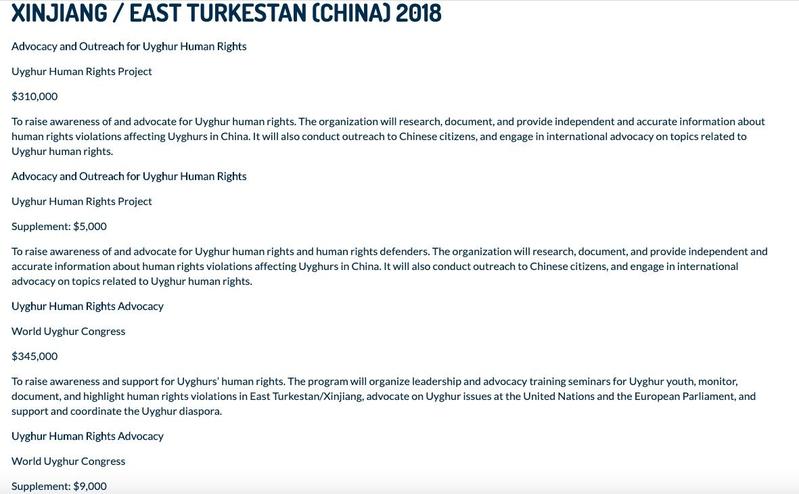
The NED has played a direct role in molding the direction and politics of the WUC. Besides honeycombing WUC-affiliated organizations with NED operatives like Coan Greve, the NED has sponsored and organized annual "Leadership Training Seminars" for the WUC since 2007.
Many leading members of the WUC have also worked in senior positions for Radio Free Asia (RFA) and Radio Free Europe/Radio Liberty (RFE/RL). These US government-run news agencies were created by the CIA during the Cold War to project propaganda into China and the Soviet Union, and to stir up opposition to communism on these countries' frontiers.
Unsurprisingly, the WUC is tightly aligned with Washington's foreign policy agenda and hostile new Cold War strategy which seeks to contain and impede the rise of China. The WUC regularly meets with and lobbies US and Western politicians, urging them to isolate and "increase the pressure on China"; ratchet up economic sanctions; curb ties with China, and withdraw Western companies from the region.
The WUC celebrated the passage of The Uighur Act of 2019 by the US House of Representatives, in December 2019. The bill, which called on the Trump administration to enact sanctions against the Chinese government, was the latest in a string of anti-China achievements.
This regime change apparatus has made its strongest impact through the media, providing a constant source of self-styled Uyghur dissidents and human rights horror stories to eager Western reporters. The exposure the WUC and its affiliates receive extends well beyond corporate media outlets known for echoing Washington's foreign policy talking points; even ostensibly adversarial, progressive, and left-wing media such as The Intercept, Democracy Now! and Jacobin Magazine have provided them with an uncritical platform.
While adopting the WUC's narrative, these self-styled alternative outlets never seem to mention the close bonds the organization and its offshoots have forged with the US national security state and right-wing ethno-nationalist movements abroad. But the relationships are no secret. In fact, they appear to be a source of pride for WUC leadership.
The Far-Right Roots of the Uyghur "Human Rights" Movement
Behind its carefully constructed human rights brand, the Uyghur separatist movement emerged from elements in Xinjiang which view socialism as "the enemy of Islam," and which sought Washington's support from the outset, presenting themselves as eager foot-soldiers for US hegemony.
The founding father of this separatist movement was Isa Yusuf Alptekin. His son, Erkin Alptekin, founded the WUC and served as the organization's inaugural president. The senior Alptekin is referred to as "our late leader" by the WUC and current President Dolkun Isa.
Born at the turn of the 20th century, Alptekin was the son of a local government Xinjiang official. He received a largely Islamic education as a youth, as his family intended for him to be a religious scholar.
During the Chinese Civil War that raged between the nationalists and communists from 1945 to '49, Alptekin served under the nationalist Kuomintang (KMT) administration in Xinjiang. Throughout this period, the KMT received massive military and economic backing from the United States — including billions of dollars in cash and military hardware, along with the deployment of tens of thousands of US marines — in an effort to quash the Chinese revolution.
At the same time, according to historian Linda Benson, Alptekin "became more active in both the Guomindang [sic] and national level politics … and met several times with [KMT leader] Chiang Kai-shek personally." For Alptekin and fellow travelers advancing Turkic nationalism and the region's eventual independence, "equally important was the necessity of protecting the land they called East Turkestan from Soviet and Chinese communism, both of which were viewed as real and present dangers to Islamic peoples."
For the KMT, Uyghur activists like Alptekin made prime candidates for Xinjiang's provincial administration. As Benson explained, "[t]he essential qualification for such appointees… was that they be anti-Communist and anti-Soviet." In his memoirs, Alptekin revealed that he "sought to eliminate all Russians and leftists in the government," and said that "schools were also encouraged to include religious instruction in their curriculum."
A fervent opponent of miscegenation, Alptekin worked to prevent intermarriage between Han Chinese and Uyghur Muslims. During his time in government, religious fundamentalists "attacked the houses of Han Chinese who were married to Moslem [sic] women […] The mob abducted the Moslem wives, and in some cases the unfortunate women were forced to marry old Moslem men." Though the violence killed numerous Han Chinese, it proceeded without any government response during Alptekin's tenure.
As the civil war wore on, Alptekin grew frustrated with the declining power of the nationalists and met with US and British Consuls in Xinjiang, beseeching the twin powers to deepen their intervention in China and the region. With the coming victory of the Chinese Revolution, Alptekin went into exile in 1949.
Alptekin eventually settled in Turkey, emerging as the pre-eminent leader of the Uyghur separatist movement throughout the latter half of the 20th century. He set out to enlist international support for the cause of East Turkestan independence, courting leading US officials and far-right, neo-Ottomanist ideologues in Turkey.
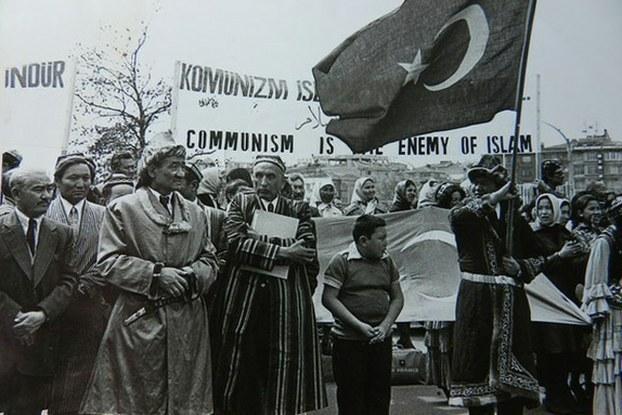
The Uyghur separatist leader wrote to then-US President Richard Nixon on several occasions, pleading for him to support East Turkestan separatism. In a 1969 missive to the president, Alptekin declared full-throated support for the US war on Vietnam: "We are hopeful and pleased that the US, as a fortress of liberty, is protecting captive nations," he stated. Altepkin then pleaded for his "Excellency" Nixon and the US, "the most imminent protector of captive nations", to support East Turkestan independence.
Alptekin wrote Nixon the following year to warn of the evils of "Red China." He branded the country "a great menace which the whole world as led by the United States of America is confronting. This menace is now in the process of evolution to engulf the earth. If time is allowed it can upset the balance of the world to disadvantage the free nations."
"The whole world has reason to be apprehensive of Red China," Alptekin insisted to Nixon, "for it is likely to be an irresistible [sic] threat on earth… China today is one of the biggest nations in the world where the Marxist teach has been implemented… China may prove to be a greater menace to all the world, and this menace is likely to cause a total destruction to the free nations if they are not prudent and fore-sighted."
Alptekin advised Nixon to combat the "Chinese war of world conquest" by supporting separatist movements, namely that of East Turkestan nationalists, and by "speeding up the process of the dismemberment of the Chinese empire."
Mapping out a detailed regime change strategy for Washington, Alptekin urged the US to generate support for his cause among the "free world," set up an academic institute to study "every aspect" of minority nationalities living within China, develop media propaganda targeting minority nationalities by operating "a radio network beaming at these peoples in their respective languages"; "devise a plan to secure [the] collaboration" of minority nationalities and "train the children of the non-Chinese exiles abroad."
In 1970, Alptekin travelled to Washington to meet with members of US Congress and address the House of Representatives.
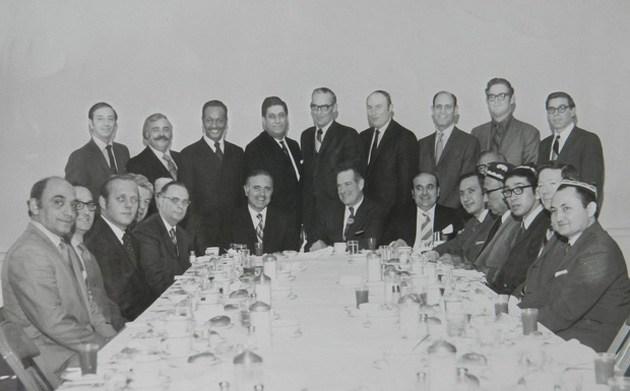
Forging bonds with fascistic, ethno-supremacist Turkish nationalists
While appealing for Washington's support, Alptekin developed strong ties with the Turkish far-right. Their bonds rested on a solid foundation of anti-communist zeal and pan-Turkic, neo-Ottomanist nationalism.
On numerous occasions, Alptekin met with Alparslan Türkeş a fascistic, ultra-nationalist who believed ardently in Turkish ethnic superiority over minorities like Kurds and Armenians, and for whom the eradication of communism among the Turkic populations of Soviet Central Asia and Xinjiang was "the dream he had most cherished".

Alparslan Türkeş and Isa Yusuf Alptekin
Türkeş was long-time leader of the far-right Nationalist Action Party (MHP) and its paramilitary arm, the Grey Wolves. According to the Washington Post, he headed a murderous group of "right-wing terrorists" who are "blindly nationalist, fascist or nearly so, and bent on the extermination of the Communists." The fascistic militant group killed numerous left-wing activists, students, Kurds, and notoriously attempted to assassinate Pope John Paul II.
With military training from the US, Türkeş co-founded the Turkish cell of Operation Gladio, the US and NATO-backed network of "stay behind" anti-communist paramilitary groups that carried out numerous acts of terror and sabotage across Europe.
Alptekin appears to have shared the hateful politics of Türkeş and the Turkish far-right, often expressing anti-Armenian views including denial of the Armenian genocide and claims that Armenians were murderers of innocent Turks.
The Turkish right-wing has embraced the East Turkestan separatist movement with open arms, appealing to them as a key base of political support. "The martyrs of East Turkestan are our martyrs," stated Recep Tayyip Erdoğan, then mayor of Istanbul, as he inaugurated a park named in honor of Alptekin, following the death of the Uyghur nationalist in 1995.
In recent decades, the Uyghur separatist movement has deepened its connections with Washington and the US national security state. The WUC and its affiliate organizations — including the Uyghur American Association, Uyghur Human Rights Project, and Campaign for Uyghurs — are made up of individuals with direct ties to the US government, military, and regime change establishment.
Inspired by pro-free market color revolutions spawned by the US government in the former Soviet republics of Central Asia, the WUC's regime change network has set out a clear goal of destabilizing China and toppling its government.
With vow to destroy China, WUC leaders earn Western adulation and support
In 2004, Erkin Alptekin was named the inaugural president of the WUC. He is the son of the far-right, ultra-nationalist father figure of the Uyghur separatist movement, Isa Yusuf Alptekin, whose background is explored later in this article. From 1971 to 1995, Erkin Alptekin worked for the US government-funded RFE/RL media network.
Speaking at the funeral of his father, in 1995, the junior Alptekin outlined his anti-communist, separatist views and articulated his desire to destroy China: "Ten years ago no one believed that the USSR would fall apart now you can see that. Many Turkic countries have their freedom now. Today the same situation applies to China. We believed in the not too distant future we will see the fall of China and the independence of East Turkestan."
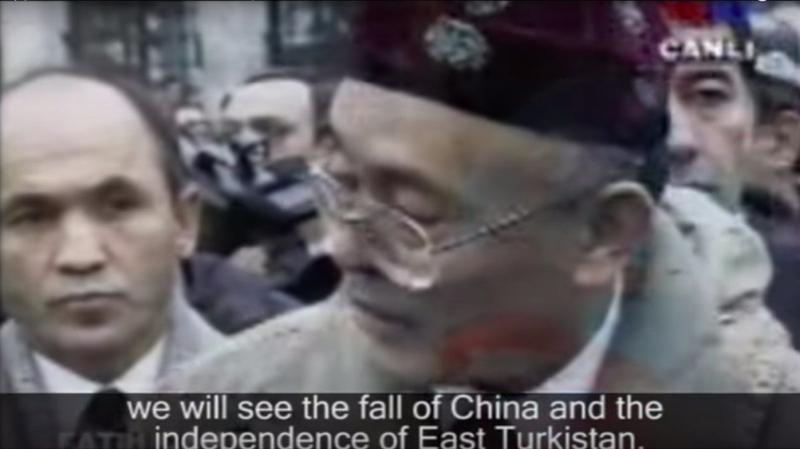
Erkin Alptekin calling for the "fall of China" at his father's funeral. From the WUC film, "Uyghur Leaders in Exile."
The WUC describes Alptekin as "close friend" of the Dalai Lama, the U.S-backed, CIA-funded figurehead for Tibetan separatism. "We are working very closely with the Dalai Lama," Alptekin told The Washington Post in 1999. "He is a very good example for us."
In 2006, Erkin Alptekin was succeeded as WUC President by Rebiya Kadeer, a self-described multi-millionaire real estate and trading entrepreneur who profited off of China's economic reforms of the 1980s and claims to have once been the seventh wealthiest individual in the country. According to The New York Times, Kadeer's "[d]issidence brought the end of her Audi, her three villas and her far-flung business empire". Kadeer's husband, SIdik Rouzi, worked for US government media outlets Voice of America and Radio Free Asia.
During her tenure as WUC President, Kadeer met with then-US President George W. Bush on several occasions. As Bush waged his illegal war on Iraq and persecuted Muslim American leadership under the auspices of his so-called "war on terror," Kadeer appealed to the US head of state to take up the cause of Uyghur Muslims. "I was deeply honored to meet with the President," Kadeer stated. She "expressed gratitude for President Bush's demonstrated commitment to promoting freedom and democratic reform in the PRC."

At the 2007 Democracy & Security International Conference in Prague, Bush praised Kadeer as a human rights defender in his address before the gathering. The conference was organized by the Prague Security Studies Institute, a think tank that aims to advance free-market societies in post-communist states, and the Adelson Institute for Strategic Studies, an Israeli outfit named for ultra-Zionist Republican casino baron Sheldon Adelson. Conference partners included the US government and NATO.
Kadeer kept close relationships with the Dalai Lama and Vaclav Havel, the leader of the 'Velvet Revolution' which brought down Czechoslovakia's communist government. Havel was a "major proponent of NATO" and instrumental to the Western military alliance's eastward expansion. Kadeer described Havel as "an uncompromising advocate for truth, justice and peace" and pointed to his political accomplishments as an example to be emulated for China. "Mr. Havel's vision for the Czech people […] speaks to Chinese democrats today", wrote Kadeer, following Havel's death, and "contains […] the seeds of a new era for political reform in China."
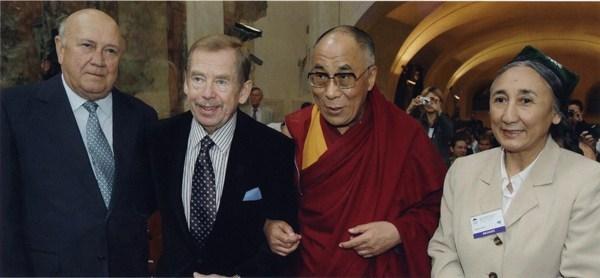
The current President of WUC is Dolkun Isa, winner of the 2019 Democracy Award from the NED. In 2016, Isa received a human rights award from the far-right Victims of Communism Memorial Foundation, which was established by the US government in 1993. In his acceptance speech, Isa emphasized "the Uyghurs' resistance to communism" and that "we will not stop our work until we consign this destructive ideology, in the words of Ronald Reagan, to 'the ash heap of history.'"
Isa regularly lobbies US and Western politicians to intensify their new Cold War agenda by enacting economic sanctions and curbing ties with China. Among those he has met with in recent years are Trump administration White House officials, right-wing Republican Senator Ted Cruz, the US Consul General in Munich, and the fervently anti-China acting Director of National Intelligence, Richard Grenell.
In November 2019, Isa attended the Halifax International Security Forum, a gathering convened by NATO and the Canadian Department of National Defence. There, he met with leading Western political and military figures.
In January 2020, Isa was hosted at an event organized by the Board of Deputies of British Jews, a right-wing British Israeli lobby group. At the event, Isa met with with the ultra-Zionist organization Bnei Akiva, whose leader called for the Israeli Army "to take the foreskins of 300 Palestinians" amid Israel's punishing 2014 assault on the besieged Gaza Strip.
Omer Kanat serves as the WUC's Chairman of the Executive Committee. Kanat helped found the WUC and has been a permanent fixture in its executive leadership. The veteran operative has a lengthy history of work with the US government, from serving as senior editor of Radio Free Asia's Uyghur Service from 1999 to 2009 to covering the US wars on Iraq and Afghanistan and interviewing the Dalai Lama for the network.
In an interview with The Grayzone editor Max Blumenthal at a 2018 NED awards ceremony in the US Capitol building, Kanat took credit for furnishing many of the claims about internment camps in Xinjiang to Western media. He conceded, however, that the WUC did not know how the oft-repeated "millions detained" claim was arrived at aside from "Western media estimates."
Preparing for a color revolution, WUC offshoots staff up with national security state operatives
Established in 1998, the Uyghur American Association (UAA) is a Washington D.C.-based affiliate of the WUC. A long time grantee of the NED, the UAA has received millions of dollars in funding. According to its publicly available tax filings, the group works closely with the US government, particularly the US State Department, Congressional-Executive Commission on China (CECC), and US Congress's Human Rights Commission.
"The National Endowment for Democracy has been exceptionally supportive of UAA," stated Nury Turkel, former UAA President, "providing us with invaluable guidance and assistance" along with "essential funding."
Turkel credited the NED with enabling the UAA increase its credibility and expand its influence. Among the top achievements he cited was a meeting with the new Krygyzstan government "within weeks of [the former government's] fall from power" following the US-engineered Tulip "color revolution" which brought a pro-Western regime to power.
Speaking at the 5th Congress of the UAA, in 2006, Turkel confirmed the regime change agenda of the UAA, UHRP and broader Uyghur separatist movement, stating that "as we witnessed the 'Tulip Revolution' and the toppling the former government of Kyrgyzstan, our hopes were again reinforced."
The UAA's leadership consists of US national security state operators including employees of the US government, Radio Free Asia, and military-industrial complex.
Kuzzat Altay, the nephew of Reibya Kadeer, is the current president of the UAA. Altay is also the founder of the Uyghur Entrepreneurs Network, which claims to offer Uyghur Americans with guidance to "start their own business".
In 2019, his business network has organized an event in collaboration with the FBI, the federal law enforcement agency notorious for its surveillance of Muslim Americans and ensnaring countless mentally troubled young Muslim American men in manufactured terror plots.
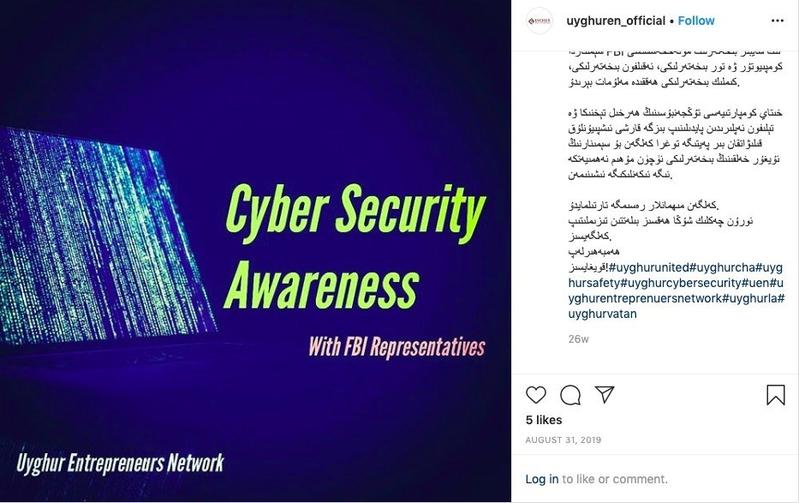
Past presidents of UAA include Kadeer; Alim Seytoff, a former Radio Free Asia correspondent and current Director of RFA's Uyghur Service; and Ilshat Hassan Kokbore, who has worked at Booz Allen Hamilton since 2008.
Booz Allen is a notorious private US military and intelligence contractor that rakes in billions of dollars in contracts with American intelligence agencies. Edward Snowden was employed at the firm when he decided to blow the whistle on the National Security Agency's invasive, all-encompassing system of mass surveillance.
The main project spun out of the UAA and the NED is the Uyghur Human Rights Project (UHRP). The UHRP was founded by the UAA in 2004 with the NED as the principal source of funding. The NED granted the UHRP a whopping $1,244,698 between 2016 and '19.
The UHRP is staffed by WUC leaders like Omer Kanat and Nury Turkel, along with former US government officials and senior members of the NED.
Dr. Elise Anderson serves as UHRP's Senior Program Office for Research and Advocacy. In 2019, Anderson served as the Liu Xiaobo Fellow, occupying a position at the Congressional-Executive Commission on China named for the far-right Chinese dissident who supported colonialism, US militarism and the "Westernisation" of China.
Anderson states that from 2012 to 2016, she was "based out of ürümchi, the regional capital of Xinjiang," conducting research for her doctorate. The extent of her activities in the region are unclear, as Anderson's CV indicates that during this time she was also working for the US government as "ürümchi Warden for the US Embassy in Beijing, China, 2014–16."
Louisa Coan Greve, the former vice president of NED, today serves as UHRP's Director of Global Advocacy. Greve formerly worked as Vice President of the NED.

Rushan Abbas, the US national security state's favorite "human rights activist"
Another influential organization spun out of the WUC network is the Campaign for Uyghurs. This group is headed by Rushan Abbas, the former Vice President of the UAA. Promoted simply as a Uyghur "human rights activist" by Western media outlets including the supposedly adversarial Democracy Now!, Abbas is, in fact, a longtime US government and military operative.
Abbas boasts in her bio of her "extensive experience working with US government agencies, including Homeland Security, Department of Defense, Department of State, and various US intelligence agencies."
While working for the military contractor L3 Technologies, Abbas served the US government and the Bush administration's so-called war on terror as a "consultant at Guantanamo Bay supporting Operation Enduring Freedom." Abbas "also worked as a linguist and translator for several federal agencies including work for the US State Department in Guantanamo Bay, Cuba and for President George W. Bush and former First Lady Laura Bush". Like so many of her colleagues, Abbas enjoyed a stint at Radio Free Asia.
While Abbas once shared her history of collaboration with the US government in the open, she has attempted to scrub biographic information from her online presence following a disastrous publicity appearance in December 2019. During a Reddit's "Ask Me Anything" question and answer forum, participants blasted Abbas as a "CIA asset" and frequent US government collaborator, prompting her attempt to disappear her bio from the internet.
Besides collaborating with the US government, Abbas' professional experience consists of aiding the expansion of US capitalism in the global south. She boasts work with consulting firms such as ISI Consultants which "assists US companies to grow their business in Middle East and African markets." Abbas claims to have "over 15 years of experience in global business development, strategic business analysis, business consultancy and government affairs throughout the Middle East, Africa, CIS regions, Europe, Asia, Australia, North America and Latin America."
Celebrating the Gray Wolves, proposing US and Turkish military intervention
Along with their extensive ties to Washington, the WUC and Uyghur separatist movement has maintained close connections with the Turkish far-right.
In 2015, members of the MHP-affiliated Grey Wolves formerly led by Alparslan Türkeş attacked South Korean tourists in Turkey, mistaking them for Chinese citizens, in protest of the situation in Xinjiang.
Turkish MHP party leader Devlet Bahçeli defended the attacks. "How are you going to differentiate between Korean and Chinese?" the rightist politician questioned. "They both have slanted eyes. Does it really matter?" Bahceli's racist remarks coincided with the display of a Grey Wolves banner at party's Istanbul headquarters reading, "We crave Chinese blood."
The Grey Wolves and Uyghur militants were blamed by Thailand's national police and an IHS-Jane's analyst of carrying out a 2015 bombing of a religious shrine in Thailand that killed 20 people. The attack was intended as revenge against the Thai government's decision to repatriate a group of Uyghur Muslims to China. Beijing had claimed the Uyghurs were en route to Turkey, Syria or Iraq to join extremist groups fighting in the region such as the al-Qaeda-affiliated East Turkestan Islamic Movement (ETIM), or Turkestan Islamic Party (TIP).
Months before the bombing, a group of 200 protesters waving East Turkestan flags attacked the Thai consulate in Istanbul in response to the Uyghur repatriation. The group was reportedly led by the Grey Wolves and East Turkestan Culture and Solidarity Association. The latter organization was headed by Seyit Tümturk, who served as WUC Vice President from 2008 to 2016 and belonged to the organization's founding pantheon.
The WUC continues to publish articles on its website that praise and celebrate Alparslan Türkeş, the far-right, ultra-nationalist founder of the Grey Wolves and long-time MHP party leader. Its website also promotes endorsements of East Turkestan separatism by current leaders of the MHP and Grey Wolves.
While building links with the Turkish far-right, leading WUC representatives have appealed to Turkish President Erdogan to take an interventionist role in China akin to Turkey's actions in Libya and Syria, where it supported the regime change efforts of the US, West and an array of extremist proxy groups.
Writing in the Wall Street Journal in 2012, Nury Turkel argued that Turkey can play a leading role in "rallying democracies" to pressure China on Xinjiang: "As a longstanding ally of the US and a neighbor of Europe, Turkey is uniquely well-situated to do this."
As a first step in this strategy, Turkel proposed that Turkey "should organize a 'friends of Uighurs' conference with democratic allies – similar to the ones organized for Libya and Syria – discussing Ankara's vision and policy objectives with respect to the Uighur people in China."
Other leading representatives of WUC have vocally endorsed Turkish military interventionism. The political statements of Seyit Tümturk, who served as WUC Vice President, underscore the extremist and militant politics behind WUC's carefully cultivated image as a "peaceful and nonviolent" human rights organization.
In 2018, Tümturk declared that Chinese Uyghurs view Turkish "state requests as orders." He then proclaimed that hundreds of thousands of Chinese Uyghurs were ready to enlist in the Turkish army and join Turkey's illegal and brutal invasion of Northern Syria "to fight for God" – if ordered to do so by Erdogan.
Shortly after Tumturk's comments, Uyghur militants dressed in Turkish military fatigues and on the Turkish side of the Syrian border released a video in which they threatened to wage war against China:
"Listen you dog bastards, do you see this? We will triumph!" one fighter exclaimed. "We will kill you all. Listen up Chinese civilians, get out of our East Turkestan. I am warning you. We shall return and we will be victorious."
The second installment of this investigation will detail the shadowy relationship between the WUC's lobbying apparatus, Western governments and violent extremist organizations like the East Turkestan Islamic Party, which are waging a separatist religious war from Western China to Syria's Idlib province.
